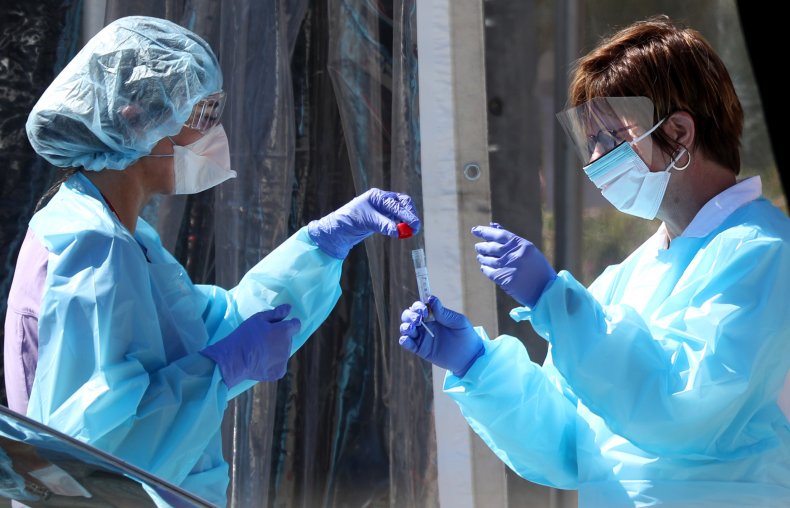What to Know About Delta COVID Variant Symptoms, Treatments As It Dominates the U.S.
The Delta variant of COVID is now the most dominant form in the U.S. by a significant margin, Centers for Disease Control and Prevention (CDC) data shows.
According to the most recent CDC data, the Delta variant, also known as B.1.617.2, accounts for 57.6 percent of all cases in the country. The next most widespread variant, Alpha or B.1.1.7, accounts for 24.9 percent of cases.
The figures are based on CDC data up to July 3 and include modelled projections that may differ from future estimates.
CDC data also shows that COVID cases are on the rise in the U.S. On Tuesday, 31,815 new cases were reported in the country, up from 20,364 the previous day.
Experts have told Newsweek what we know about the Delta variant so far.
What are the symptoms?
Generally, the symptoms of the Delta variant are similar to those of earlier variants of COVID, and experts told Newsweek the CDC therefore does not need to change its guidance to reflect Delta.
However, there are suggestions that slightly different symptoms are more common in patients with the Delta variant than past forms of the virus.
The CDC states the symptoms of COVID include fever or chills, a cough, shortness of breath or difficulty breathing, fatigue, muscle or body aches, headache, a new loss of taste or smell, a sore throat, congestion or runny nose, nausea or vomiting, and diarrhea.
The UK's ZOE COVID Symptom Study found that headache, sore throat and runny nose were the top three symptoms reported among unvaccinated people, whilst loss of smell and shortness of breath were now further down the list. The study was conducted when Delta was the dominant form of COVID in the U.K.
However, Jason Kindrachuk, assistant professor of viral pathogenesis at the University of Manitoba, said it is important to remember that the data was based on reports entered into the ZOE COVID Symptom Study app without any variant identity information attached.
Lisa Moreno-Walton, a professor of emergency medicine at Louisiana State University Health Sciences Center, said Delta symptoms appear similar to those of earlier variants, though she said there may now be a higher number of patients with runny noses.
Sabrina Assoumou, an infectious diseases physician at Boston Medical Center, said there have been early reports of more upper respiratory symptoms such as runny nose and cough with Delta than with the original version of COVID—though she added "it is hard to tell if we are now seeing more cold viruses because of less mask wearing or physical distancing."
Are treatments different?
At the moment, no. Experts told Newsweek that the Delta variant does not require different hospital treatment than other COVID variants.
Kindrachuk said: "Given the paucity of SARS-CoV-2 therapeutics though, this is perhaps unsurprising as treatments have been very limited for hospitalized patients throughout the pandemic."
Do vaccines still work against Delta?
Yes. Earlier this month, the CDC and Food and Drug Administration (FDA) released said in a joint statement that fully vaccinated people are protected from severe disease and death even from the Delta variant, and that fully-vaccinated Americans "do not need a booster shot at this time."
There has been some discussion about the effectiveness of the Pfizer vaccine against the Delta variant recently after an Israeli study found it was less effective at preventing infection and symptomatic illness than against other variants.
However, the study still found that the Pfizer shot was 93 percent effective at preventing serious illness and hospitalization from Delta, which is only slightly lower than against other variants.
Should Americans be concerned?
There is not a consensus on how much more dangerous the Delta variant may be than earlier variants, but it is thought to be more contagious than the Alpha variant.
According to Linas, the jury is still out as to whether Delta causes more severe disease than other COVID-19 variants, but it is "clear" it is more infectious.
Kindrachuk, too, said that while there is "no clear evidence on increased disease severity following hospitalization" with Delta, its increased transmissibility compared to Alpha cannot be overstated.
However, Moreno-Walton said the Delta variant is "more contagious and more lethal" than the Alpha variant and that "individuals who contract the Delta variant are more likely to be hospitalized, more likely to be intubated and more likely to die."
All the experts Newsweek spoke to said that while vaccinated people are offered protection against Delta, unvaccinated people are the biggest concern.
Benjamin Linas, associate professor of epidemiology at Boston University School of Public Health, said: "Personal concern about Delta is 100 percent related to vaccination status. If you are vaccinated, then delta is not a major threat to your health.
"On the flip side, if you are NOT vaccinated, then Delta is a real concern and poses a threat."
And Kindrachuk said that while vaccines do offer a level of protection against the variant, it does not render individuals impervious to catching the virus and passing it on to other people.


